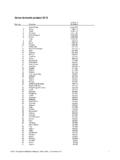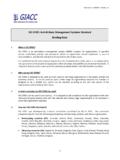Transcription of Trafficking of Migrant Domestic Workers in …
1 Trafficking of Migrant Domestic Workers in lebanon A Legal Analysis by Kathleen HamillKafa (enough) Violence & ExploitationMarch 2011 2 This study is part of the Multimedia Virtual Space for Human Rights project funded by the European Union. It is carried out by the Italian NGO COSV (Coordination Committee of the Organizations for Voluntary Service) in partnership with three Lebanese NGOs: KAFA (enough) Violence & Exploitation, the Permanent Peace Movement (PPM) and the Lebanese Center for Human Rights (CLDH). The establishment of a Multimedia Virtual Space for Human Rights is the key objective of a two-year project (2009-2010) that aims at strengthening mutual cooperation among civil society organizations for a better integration of human rights, democratization and good governance in national development open coalition of NGOs has been drawn up for the management of the virtual space and the project includes, among other activities, researches on various human rights topics in lebanon ranging from freedom of association to Trafficking and racism.
2 For more information on the project, please consult Apart from the 4 project partners, the NGOs taking part in the Human Rights in lebanon Coalition to date are: Amel Association, Amnesty International lebanon , Association Libanaise pour l Education et la Formation (ALEF), Association Najdeh, INSAN Association, Lebanese Association for Civil Rights (LACR), Lebanese Association for Democratic Elections (LADE), Lebanese Center for Civic Education (LCCE), and Support of Lebanese in Detention an Exile (SOLIDE).This publication has been produced with the assistance of the European Union. The contents of this publication are the sole responsibility of the Lebanese Center for Human Rights (CLDH), COSV (Coordination Committee of the Organizations for Voluntary Service), KAFA (Enough) Violence & Exploitation and the Permanent Peace Movement (PPM) and can in no way be taken to reflect the views of the European Union. Kafa (enough) Violence & Exploitation, COSV (Coordination Committee of the Organizations for Voluntary Service), Lebanese Center for Human Rights (CLDH) and the Permanent Peace Movement (PPM).
3 Kafa (enough) Violence & Exploitation, Badaro, 43 Badaro street, Beydoun bldg., 1st floor, 116- 5042, Beirut, lebanon +961-(0)1-392220-1 of ContentsAbout KAFA (enough) Violence & Exploitation 4 Author biography 41. Executive Summary 52. Introduction 73. Definitions and overview of international standards 10 What is Trafficking ? 11 What is the meaning of forced labor, servitude, slavery and practices similar to slavery ? 13 Conspiracy, Intent, and Lack of Consent 174. The Lebanese context 19 Analysis of forced labor, servitude, slavery and practices similar to slavery in lebanon 205. The sponsorship system 25 Immigration regulations 25 Visa and permit mechanics 276. The recruitment process 32 Deception and Due Diligence 33 Country bans and indirect routes to lebanon 34 Commissions, recruitment fees, and profits 407.
4 The lack of labor protection and legal redress 42 Labor Law Reforms 438. Conclusion 46 Recommendations 48 Appendices 49 APPENDIX A 49 APPENDIX B 51 Bibliography 534 About KAFA (enough) Violence & ExploitationEstablished in 2005 by a group of multi-disciplinary professionals and human rights activists, KAFA (enough) Violence & Exploitation is a Lebanese non-profit, non-political, non-confessional civil society organization committed to the achievement of gender-equality and non-discrimination, and the advancement of the human rights of women and children. KAFA envisions a society where all its citizens live free of violence and exploitation and where they have equal access to opportunities and results and their human rights are respected, protected and enjoyed. KAFA believes that women s and children s rights are integral to this achievement and to building a free and fair society.
5 KAFA s mission is to work towards eradicating all forms of gender-based violence and exploitation of women and children through advocating for legal reform and change of policies and practices, influencing public opinion, and empowering women and children. Our focus areas are those of 1) Violence against Women 2) Child Sexual Abuse 3) Exploitation and Trafficking in Women 4) Socio-Legal Counseling. KAFA combines in its work the various methods of lobbying, action-research, publication, training and awareness raising, and supporting the victims. Our work s guiding principles are those of the universality of human rights and the participation and inclusion of all target groups and marginalized people in our biographyKathleen Hamill, , , Esq. is the author of this study. She is a licensed lawyer and an adjunct professor of international law at the Fletcher School of Law and Diplomacy at Tufts University. She holds a doctor of jurisprudence degree from Boston College Law School, a Masters Degree in International Law and Diplomacy from the Fletcher School, and a from Brown University.
6 Hamill has worked as an independent researcher, advocate, and consultant in the Americas, Asia, Africa, Europe, and the Middle East. This includes academic fellowships and work in Angola (Conflict Management Group), in Brazil (Human Rights Watch), in Jordan (WILpower - regional association of women lawyers), in lebanon (United Nations Development Program). Hamill co-authored an amicus curiae brief in the Supreme Court case, Nike v. Kasky, and she authored a petition to the Inter-American Human Rights Commission in the case of Nogueira v. Brazil. Her paper, International Law, Cluster Munitions, and Perceptions of Justice, was presented in 2008 at the American University of Beirut conference, America and the Middle East: Liberty and Justice. In Geneva, she participated in a civil society delegation for lebanon s 2010 Universal Periodic Review before the United Nations Human Rights Council, and she was the lead author of KAFA s stakeholder submission for that purpose.
7 Also in 2010, she was a resident faculty member in Bogota, Colombia for the Fletcher School s Mexico Judiciary Reform Program. As a Fletcher professor, Hamill has served the Armenian Diplomat Training Program and the Fletcher Institute for the Advanced Study of Nonviolent Conflict. Her recent courses at Fletcher include International Human Rights Law as well as Human Rights and Executive SummaryHuman Trafficking and its link to Migrant Domestic labor in lebanon is a complex, sensitive, and challenging issue. It raises numerous questions and demands further exploration. Under international law human Trafficking consists of the recruitment, transfer, or receipt of human beings by coercive or deceptive means for purposes of exploitation including both sexual exploitation and labor exploitation. The present study seeks to address human Trafficking for labor exploitation in particular. The primary objective is to identify and analyze the key factors that make Migrant Domestic Workers vulnerable to human Trafficking within the context of lebanon .
8 In doing so, this study aims to encourage further research and a country of over four million people, lebanon is home to roughly 200,000 or more Domestic Workers who migrate to work as live-in maids from across Asia and Africa - primarily from Ethiopia, the Philippines, Bangladesh, Sri Lanka, and Nepal. For this study, 100 Migrant Domestic Workers were surveyed, and 65% reported that they had experienced a situation of forced labor, servitude, or slavery at some point during their time in lebanon . When labor exploitation of Migrant Domestic Workers rises to the level of forced labor, servitude, or slavery, then human Trafficking may be found to study does not suggest that all Migrant Domestic Workers in lebanon have suffered abuse at the hands of their employers. Nor does the study aim to approximate the number of maltreated Domestic Workers in the country. Rather the aim is to identify structural factors that create systemic vulnerabilities for Migrant Domestic Workers during their migration to lebanon and their work upon arrival in the country.
9 Human Trafficking can be one of the worst outcomes of a range of abuses experienced by Migrant Domestic Workers in lebanon . These may also include violations of labor rights as well as verbal, physical and even sexual abuse. As found here and in other research studies, Domestic Workers in lebanon routinely experience confiscation of their identity documents and restrictions on their freedom of movement and well, Migrant Domestic Workers frequently report excessive working hours and delayed or non-payment of wages. When Domestic Workers are subject to such working conditions, they may be classified as victims of labor exploitation and possibly Trafficking , depending on the specific circumstances. The present study explores and explains this situation of vulnerability. The vulnerability of all Migrant Domestic Workers to human Trafficking in lebanon can be attributed to various structural factors. The structural factors detailed in this study include 1) the sponsorship or kafala system; 2) the recruitment process; 3) and the lack of labor protection and legal redress.
10 In addition, the Lebanese government s refusal to respect current deployment bans from several sending countries exacerbates the vulnerability of Migrant Domestic Workers to Trafficking . These various structural factors foster the conditions where abuse and Trafficking of Domestic Workers often , the sponsorship system creates an environment where all Migrant Domestic Workers have the potential to become entrapped and exploited. The system links a Domestic worker s valid immigration status to one single employer. Under the sponsorship system and under Lebanese law, Migrant Domestic Workers may not leave the house, which is also their place of work, without the permission of their employers. In effect, employers are legally entitled to confine Domestic Migrant Workers to the house for years, although it is impossible to determine what percentage of employers actually do so. When Domestic Workers do find themselves in situations of exploitation, then the sponsorship system typically prevents them from seeking and obtaining help without jeopardizing their legal status in the 6country.



